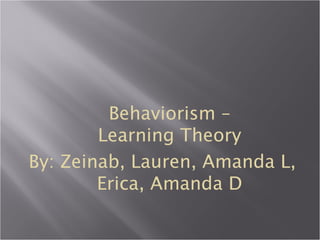
Behaviorism learning theory
- 1. Behaviorism – Learning Theory By: Zeinab, Lauren, Amanda L, Erica, Amanda D
- 2. The theory is based on observable behaviors. It describes how all learning and behaviors are directly correlated with environmental stimuli. It can be a stimulus causing a response by having with it put with a trigger. An example of this would be a dog salivating when they hear a bell that he correlates with food. Another concept of this theory is to reward a reaction with a having a stimuli. A dog pushing a button to release food would be a good example for this. In addition, behaviorists do not believe that there is any difference between humans and animals because both can be trained by using positive and negative rewards.
- 3. Ivan Pavlov is known for using dogs for behavioral tests. He used a bell to teach the dogs to know that food was being given and it resulted in the dogs salivating while waiting for the food. This became known as classical conditioning.
- 4. B.F. Skinner founded behavioral, or operant, conditioning. He used pigeons with his experiments. After giving the pigeons rewards when they do a specific activity, they learned that they must to that all the time to get the reward. Skinner even taught the pigeons to dance and bowl! He believed that positive reinforcement ultimately forms peoples’ behaviors. He also believed that behaviors would be released if the response were negative. Another person associated with this theory is Albert Bandura who became well known for the Social Cognitive Theory. Instead of just focusing on how the environment affects behavior, he found that motivational factors also play a key part of a person’s behavior. An example of this would be people imitating behaviors that they would observe.
- 5. Teacher’s Role in Behaviorism: - Motivates and facilitates learning - Actively keeps students participating - Provides the stimulus (which may be the lesson plan, theme, or subject matter at hand) - Provides positive reinforcement
- 6. Provides the stimulus: - Teachers should present material in small portions - Teachers should use repetition and lots of practice Provides positive reinforcement - Teachers should offer rewards for correct responses; this may be through: a) Stickers (for younger) b) Special recognition or duties (elementary) c) Bonus points (middle – high school) Technology: many software programs provide rewards, such as mini-games for answering questions correctly; Also, using computer time (which is exciting for students) as a reward will provide positive feedback and integrate technology to the class
- 7. Students Role in Behaviorism: Children work for rewards of some sort. Their behavior is diverse based on their environmental surroundings, thus children respond differently. Children respond to stimuli.
- 8. Many computer programs reward the student when an answer is correct or a goal is reached. Children use the internet to play math games and quiz their selves on books they have read. Many times they receive a physical prize from the school for getting so many points in these games. Technology has enthused children to like learning and under the behaviorist theory children are working for their reward while doing something they like and avoiding punishment.
- 9. We think that Pavlov’s classical conditioning behavioral experiments and learning theory is important to study before teaching our own class. There is much to be learned from Pavlov’s theory that can be applied to our classroom. It can be used to help students follow good behavior and can also be used to help anxiety and fear that students may face in a classroom.
- 10. Good behavior can be enforced using Pavlov’s theory of classical conditioning. Actions such as students raising their hand to speak could be considered one example of classical conditioning. Students realize after given time that when they want to speak they will only be recognized after they have raised their hand. We, as teachers, could also use classical conditioning to help influence good behavior in the classroom. When students complete their homework they will be given a star, then when they reach 10 stars, they can be given a reward. Eventually, students get in the habit of doing homework without having to be rewarded all the time. It will also encourage the students, who would not normally do their homework, to want to complete their homework and receive stars.
- 11. McDevitt, TM, & Ormrod, JO. (2002). Child development and education. New Jersey: Pearson Education, Inc. “Behaviorism Theory." Michigan State University. Est. 1855. East Lansing, Michigan USA. Web. 18 Nov. 2010. <https://www.msu.edu/~purcelll/behavioris m theory.htm>.